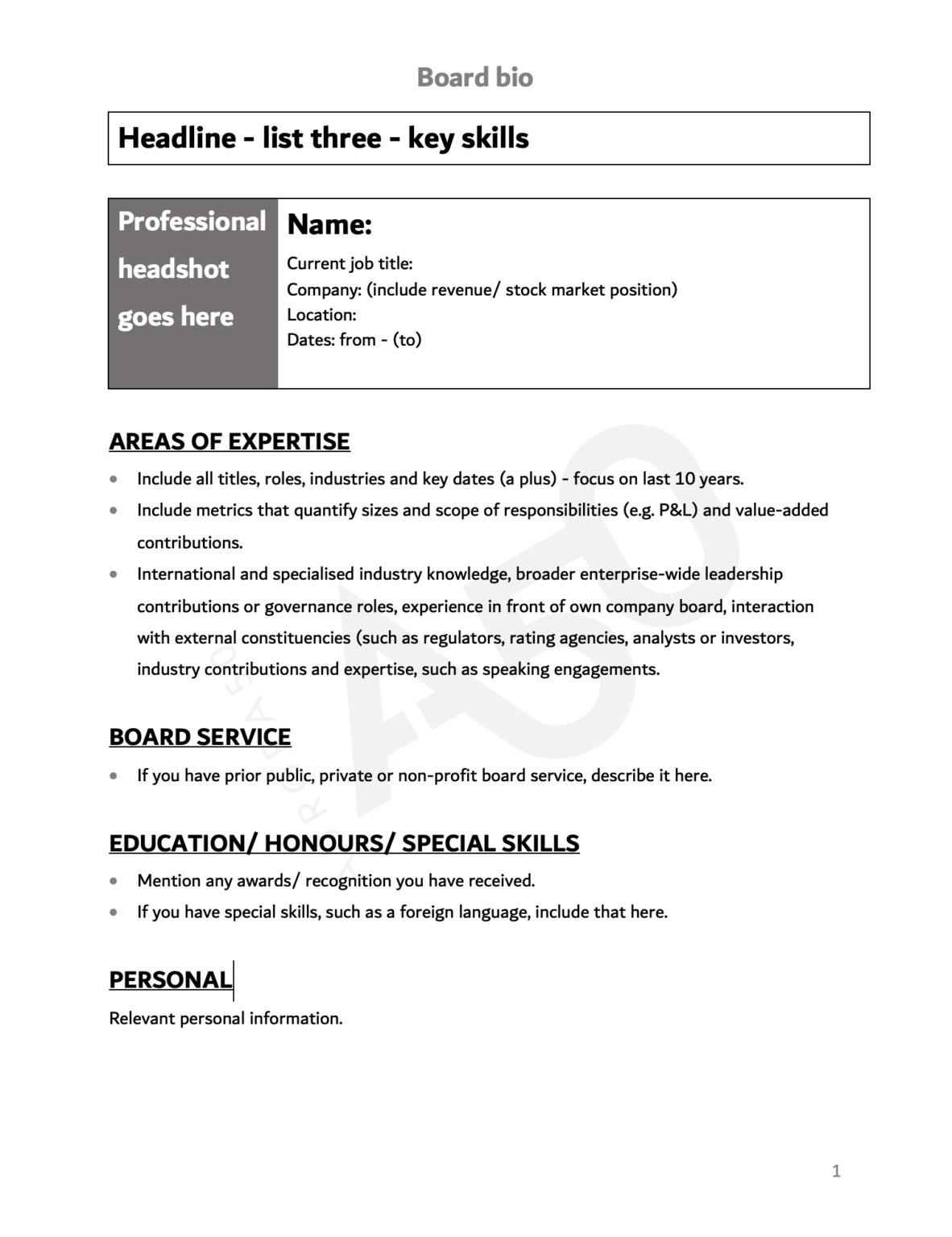A board bio is a one-page summary about you, written for a board secretary, CEO or chair to read, which outlines your potential fit for that specific board , writes Dr Rony Touma, managing director, MENA, for executive and board search firm Spencer Stuart.
It is not the same as an executive CV or resumé.
It is not an interview on a page.
It is not the same as the board profiles you see on a company’s site.
You must think of a board bio as a highly flexible document that is adapted for each opportunity and is highly relevant to a specific company and board.
Be board-ready with your bio
Write a generic profile and keep that as your core document, but tailor your bio for each board position you apply for. Be board-ready with your bio.
Do identify target people and companies you would like to represent, then look hard for opportunities as they arise.
As few board seats are ever advertised, use your network – and also network with executive search firms. Identify yourself to the market.
The first board is the hardest
Do not under-estimate the importance of a non-profit organisation for your first board opportunity.
It is a safe learning ground and a value-add for both sides. Think about university boards or sports clubs, too.
The same goes for subsidiary boards within your current company – this is low-risk for your company but highly beneficial to you.
Challenge managers regularly to let you present to the board whenever possible.
Expect lots of trial and error when you’re trying to get that first board seat: be patient and realistic.
You must be engaged and current with your board bio and skills, and open-minded about the roles available.
A board bio is a story
While your board bio should only be one page, you are still telling a story, albeit succinctly.
Use powerful action verbs (‘managed’, ‘led’, ‘motivated’, ‘initiated’ and, especially, ‘achieved’) to begin sentences.
Avoid more passive verbs such as ‘helped’ and ‘contributed’ – and avoid ‘ loyal’, ‘passionate’, ‘hard-working’ and ‘team player’.
Stick to the facts and, if you struggle to write about yourself, it can be easier to do so in the third person.
Remember you are connecting the dots for CEOs, board chairs and secretaries; this is not a time for buzzwords.

Dr Rony Touma: “While your board bio should only be one page, you are still telling a story, albeit succinctly.”
Suggested elements of a board bio
We do not provide a template for board bios. Instead we suggest you incorporate the following elements:
- Photo – this is important. Use a professional headshot
- Board value proposition/ candidate profile
- Board experience (if applicable): This can include experience in front of your own company board, governance roles, interaction with external
- Career history/ summary context: Give all titles, roles and (a plus) key dates. Metrics are very important to show impact – sizes and scope of responsibilities and value-add contributions. Do show any non-profit work
- Education: Including degrees, certifications
- Personal information and interests, as appropriate
Boards are also interested in:
- Speaking engagements and other intellectual capital you can show
- Interactions with external stakeholders, such as regulators, rating agencies, analysts or investors
- Professional affiliations
- Third-party recognition and awards
Metrics are very important to show impact.
There is a skew to board-relevant topics such as governance, presenting to boards, challenging boards in discussions or dealing with external stakeholders.
As boards generally have three-year terms, job-hoppers who have repeatedly left a job after a couple of years will raise question marks. Short tenures do not need to be career-limiting but boards will prefer not to take the risk if it is a pattern.
Trends in appointments of non-executive directors (NEDs)
CEOs account for over half of new appointments to boards but executives from below board level are becoming more common.
Equally boards often ask for recently retired executives who have the recent experience but also the time to dedicate to their board role.
Today it is increasingly common for younger directors to be appointed, often those with specific technology or geographic expertise; this can also help to correct diversity imbalance on boards. There is an increased focus on experience, both international and local.
Experience boards require from NEDs
- Commercial/ operational (profit and loss (P&L), strategy restructuring, mergers and acquisitions (M&A), turnaround, innovation)
- Functional expertise (finance, HR and remuneration, digital, supply chain, marketing)
- Additional skills (environmental, social and governance (ESG), capital markets, financing and investor relations, regulation and compliance, geopolitical trends). Transformation is a magic word for the region!
These days I am doing multiple searches for NEDs where
ESG is a key topic.
Characteristics of an ideal NED
- Low in ego yet high in self-confidence: the capacity to be collaborative is the top strength boards look for, so do showcase this
- Prepared both to challenge and support management yet still be a team player
- Commercially aware, financially literate, a good appreciation of risk – boards are less interested in operations as such
- Internationally minded
- Fair-minded, with absolute integrity and wisdom and, above all, courage and common sense
- A relationship-builder and an ambassador
- Intellectually flexible, with a sharp mind, able to think laterally and beyond your area of expertise
- Articulate and persuasive, whilst being a good listener and a good communicator
- Ability to deal with complexity
- Conversant with the prevailing governance practice and fiduciary duties
Board bio template
While Spencer Stuart do not provide a template for board bios, Aurora50 is asked for one so regularly that we have set out some advice in a formatted Word document to start you off.
Download the Aurora50 board bio template.
All the elements you need for a one-page board bio – Aurora50













